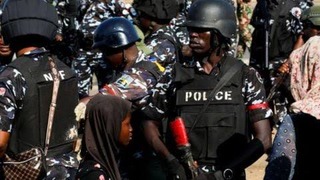JNIM Launches Coordinated Attacks in Bamako and Niger, Targeting Key Military Sites
By: Zagazola Makama
In a bold and coordinated strike, Jama'at Nasr al-Islam wal Muslimin (JNIM), an al-Qaeda-affiliated group, launched a series of attacks on strategic military sites in Bamako, the capital of Mali, early on September 17th, 2024. The assault targeted the Faladiè Gendarmerie School and the 101st Air Base near Modibo Keita Airport, resulting in significant casualties and destruction. This follows a similar attack in Niger's Tillaberi region a day prior, raising regional security concerns.
According to reports, at least eight security personnel were killed, including six at the gendarmerie school and two at the airbase. In addition to the loss of life, the attacks inflicted severe material damage, including reports of planes being set ablaze, with unconfirmed accounts suggesting that the Malian presidential jet was among those destroyed. Eyewitnesses described scenes of chaos, with fires and gunfire echoing through the area. The assault on the airbase was the second strike of the day, following the morning attack on the gendarmerie.
JNIM quickly claimed responsibility for the attacks, releasing photos and footage of the assaults through their media outlet, Az-Zallaqa. Among the visuals shared were images of the suicide attackers, referred to as "immersionists," who carried out the coordinated strikes. Only ten JNIM fighters are believed to have executed the attacks, with three militants reportedly killed and two arrested. An angry mob lynched at least one person, suspected of involvement in the attacks, while individuals of Fulani heritage from neighboring Niger were reportedly harassed and attacked in the aftermath.
The attack in Bamako follows closely on the heels of another major assault by JNIM in Niger’s Tillaberi region, where a base in Niakirté was attacked, resulting in the deaths of 37 soldiers. These strikes come just before and after the formal announcement of the African Economic Security (AES) Confederacy, raising concerns about the timing and intent of the jihadist group.
Analysis: Regional Security in Jeopardy
The dual attacks highlight the increasing capability and reach of JNIM, as well as the escalating security crisis in the Sahel region. The group's ability to strike key military installations in Mali's capital underscores vulnerabilities in intelligence gathering and coordination among regional forces. There are growing concerns about foreign influence, with Mali's rejection of support from France and Ukraine, and Russia’s increasing involvement in the region, sparking debate over potential foreign complicity.
As the Sahel's security landscape continues to deteriorate, it is becoming increasingly clear that without enhanced cooperation and intelligence-sharing between regional forces, the threat posed by al-Qaeda and ISIS-affiliated groups like JNIM will continue to grow. Addressing these gaps is crucial to restoring stability in the region.






























